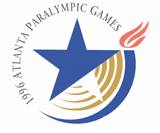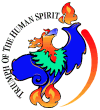1996 Summer Paralympics
 | |||
| Host city | Atlanta, United States | ||
|---|---|---|---|
| Motto | The Triumph of the Human Spirit | ||
| Nations participating | 104[1] | ||
| Athletes participating | 3259 (2469 men, 790 women)[1] | ||
| Events | 508 in 20 sports | ||
| Opening ceremony | August 16 | ||
| Closing ceremony | August 25 | ||
| Officially opened by | Vice President Al Gore | ||
| Paralympic torch | Mark Wellman | ||
| Paralympic stadium | Centennial Olympic Stadium | ||
| Summer: | |||
| |||
| Winter: | |||
| |||
| Part of a series on |
The 1996 Paralympic Games in Atlanta, USA were held from August 16 to 25. It was the first Paralympics to get mass media sponsorship,[1] and had a budget of USD $81 million.[2]
It was the first Paralympic Games where International Sports Federation for Persons with an Intellectual Disability athletes were given full medal status.[3]
Symbol and mascot of the games

The mascot for the Paralympic Summer Games in Atlanta 1996 was Blaze. Blaze was created by Trevor Stone Irvin of Irvin Productions in Atlanta.
Blaze is a phoenix, a mythical bird that rises from ashes to experience a renewed life. The phoenix appears in Egyptian, Arabian, Chinese, Russian and Native American folklore and in all instances symbolizes strength, vision, inspiration and survival. The phoenix was an ideal mascot for the 1996 Atlanta Paralympic Games and later for BlazeSports America, a nonprofit organization that is the direct legacy of the Games. The phoenix has long been the symbol of Atlanta’s rebirth after its devastation in the American Civil War. But most importantly, it is the personification of the will, perseverance and determination of youth and adults with physical disability to achieve full and productive lives. Blaze, with his bright colors, height and broad wing span, reflects the traits, identified in a focus group of athletes with disability, as those they believed best represented the drive to succeed of persons with physical disability who pursue sports as recreation and as a competitive endeavor. Today, Blaze is the most recognizable symbol of disability sport in America.
Sports

The games consisted of 508 events spread over twenty sports, including three demonstration sports.[1]
- Archery
- Athletics
- Boccia
- Cycling
- Equestrian
- Football 7-a-side
- Goalball
- Judo
- Lawn bowls
- Powerlifting
- Racquetball (demonstration sport, but medals awarded)
- Sailing (demonstration sport, but medals awarded)
- Shooting
- Swimming
- Table tennis
- Volleyball
- Wheelchair basketball
- Wheelchair fencing
- Wheelchair rugby (demonstration sport, but medals awarded)
- Wheelchair tennis

Venues
In total 11 venues were used at the 1996 Summer Olympics and five new venues were used at the Games in Atlanta.[4]
Olympic Ring
- Centennial Olympic Stadium – opening/closing ceremonies, athletics
- Alexander Memorial Coliseum – standing volleyball
- Georgia Tech Aquatic Center – swimming
Metro Atlanta
- Henderson Arena – judo and wheelchair rugby
- Panther Stadium – lawn bowls and 7-side-football
- Woodruff P.E. Center - boccia
- GSU Sports Arena - goalball
- Marriott Marquis - powerlifiting
- Sheffield Building - wheelchair fencing
- Forbes Arena and Omni Coliseum - wheelchair basketball
- Clayton State Arena - sitting volleyball
Another Venues
- Lake Lanier – yachting
- Georgia International Horse Park – equestrian
- Infinite Energy Center - table tennis
- Stone Mountain Park - archery,wheelchair tennis and cycling
- Wolf Creek Shooting Complex - shooting
Medal count
A total of 1577 medals were awarded during the Atlanta games: 518 gold, 517 silver, and 542 bronze. The host country, the United States, topped the medal count with more gold medals, more bronze medals, and more medals overall than any other nation. Germany took the most silver medals, with 58.[5]
In the table below, the ranking sorts by the number of gold medals earned by the top ten nations (in this context a nation is an entity represented by a National Paralympic Committee). The number of silver medals is taken into consideration next and then the number of bronze medals.
Host country (United States)
| Rank | Nation | Gold | Silver | Bronze | Total |
|---|---|---|---|---|---|
| 1 | | 47 | 46 | 66 | 159 |
| 2 | | 42 | 37 | 27 | 106 |
| 3 | | 40 | 58 | 51 | 149 |
| 4 | | 40 | 42 | 41 | 123 |
| 5 | | 39 | 31 | 36 | 106 |
| 6 | | 35 | 29 | 31 | 95 |
| 7 | | 24 | 23 | 24 | 71 |
| 8 | | 17 | 11 | 17 | 45 |
| 9 | | 16 | 13 | 10 | 39 |
| 10 | | 14 | 10 | 13 | 37 |
| Total | 518 | 517 | 542 | 1577 | |
Participating delegations
One-hundred and four delegations participated in the Atlanta Paralympics.
Gallery
-

-
.jpg)
Wheelchair tennis
-
.jpg)
-
.jpg)
Welcome home parade
-
.jpg)
-
.jpg)
See also
| Wikimedia Commons has media related to 1996 Summer Paralympics. |
- 1996 Summer Olympics
- BlazeSports America, the legacy organization of the 1996 Paralympic Games
References
- 1 2 3 4 "Atlanta 1996 - General Information". International Paralympic Committee. 2008. Retrieved July 12, 2011.
- ↑ Ian Brittain (2009). The Paralympic Games Explained. Taylor & Francis. p. 83. ISBN 0-415-47658-5.
- ↑ Robert Daniel Steadward; Elizabeth Jane Watkinson; Garry David Wheeler (2003). Adapted physical activity. University of Alberta. p. 577. ISBN 0-88864-375-6.
- ↑ "Tickets". Atlanta Paralympics Organizing Committee. 1996. Archived from the original on February 6, 1997. Retrieved 16 October 2016.
- ↑ "Medal Standings - Atlanta 1996 Paralympic Games". International Paralympic Committee. 2008. Archived from the original on June 5, 2011. Retrieved July 12, 2011.
External links
- International Paralympic Committee
- Official site at the Wayback Machine (archived May 7, 2009)
.svg.png)